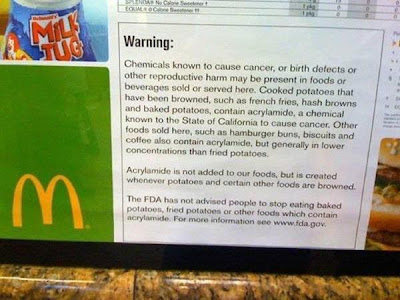
Americans may have plenty of reasons to fear French fries. While they are one of the country's favorite foods, they are soaked with trans fats, loaded with sodium and full of simple carbs, the bad kind. And, it turns out, they are also full of a chemical called acrylamide, which is known to cause cancer in laboratory rats and mice.
Noah Berger for The New York Times
Bill Lockyer, California's attorney general, says that warning labels about acrylamide in fries and chips are intended to benefit everyone.
That discovery a few years ago has raised questions about the safety of fries, as well as potato chips, which are also packed with acrylamide.
It ultimately led to a showdown this summer over whether such foods should bear health warning labels and whether companies should be required to reduce acrylamide levels in their food.Americans spend an estimated $4 billion a year on fries and $3 billion a year on potato chips. In addition to McDonald's, Burger King and Frito-Lay, other companies named in the suit are KFC, a division of Yum Brands; Wendy's International; Lance, which makes Cape Cod potato chips; H. J. Heinz, which produces Ore-Ida frozen potato products; the potato chip company Kettle Foods; and Procter & Gamble, which sells Pringles. The attorney general's office cites a dozen acrylamide animal studies showing both cancer and birth defects, as well as the federal Environmental Protection Agency's regulation of the chemical as a carcinogen for 13 years. "It is in 40 percent of the calories consumed in the average American diet." Frying and baking potatoes at home create acrylamide as well. Acrylamide is also found in lesser amounts in breads, cereals, cookies and crackers, as well as roasted nuts and some vegetables that have been grilled or sautéed. Scientists say that is because acrylamide is created, generally speaking, when the naturally occurring amino acid asparagine is heated to temperatures above 250 degrees in the presence of sugars or starches. Potatoes have a lot of both asparagine and starch, and are often fried at temperatures of up to 400 degrees.
Noah Berger for The New York Times
Bill Lockyer, California's attorney general, says that warning labels about acrylamide in fries and chips are intended to benefit everyone.
That discovery a few years ago has raised questions about the safety of fries, as well as potato chips, which are also packed with acrylamide.
It ultimately led to a showdown this summer over whether such foods should bear health warning labels and whether companies should be required to reduce acrylamide levels in their food.Americans spend an estimated $4 billion a year on fries and $3 billion a year on potato chips. In addition to McDonald's, Burger King and Frito-Lay, other companies named in the suit are KFC, a division of Yum Brands; Wendy's International; Lance, which makes Cape Cod potato chips; H. J. Heinz, which produces Ore-Ida frozen potato products; the potato chip company Kettle Foods; and Procter & Gamble, which sells Pringles. The attorney general's office cites a dozen acrylamide animal studies showing both cancer and birth defects, as well as the federal Environmental Protection Agency's regulation of the chemical as a carcinogen for 13 years. "It is in 40 percent of the calories consumed in the average American diet." Frying and baking potatoes at home create acrylamide as well. Acrylamide is also found in lesser amounts in breads, cereals, cookies and crackers, as well as roasted nuts and some vegetables that have been grilled or sautéed. Scientists say that is because acrylamide is created, generally speaking, when the naturally occurring amino acid asparagine is heated to temperatures above 250 degrees in the presence of sugars or starches. Potatoes have a lot of both asparagine and starch, and are often fried at temperatures of up to 400 degrees.

No comments:
Post a Comment